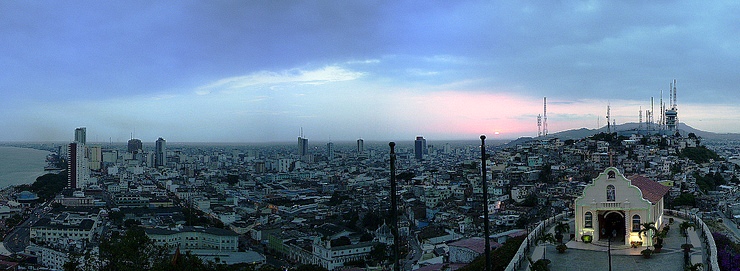Event wrap-up: "Best Practices in Integrated Transport Systems and BRT in Latin America"
Inaugural conference in Guayaquil, Ecuador draws more than 150 participants
Source: EMBARQ

More than 150 representatives from cities across South America, Europe and Asia participated in the inaugural conference of Best Practices in Integrated Transport Systems and Bus Rapid Transit (BRT) in Latin America, also known as Congreso SIBRT, on April 25-27 in Guayaquil, Ecuador.
The four-day conference was hosted by the Latin American Association for Integrated Transport Systems and Bus Rapid Transit (SIBRT) and co-organized by Metrovía Foundation and EMBARQ, with the support of the Municipality of Guayaquil.
Senior representatives from Latin America’s most influential transit agencies shared experiences and best practices of integrated transport and BRT systems.
«Congreso SIBRT emphasized the benefits of developing sustainable transport systems in Latin America cities», said Fernando Paez, president of SIBRT. «It provided a space for cities to exchange goals and solutions to improve quality of life».
Paez underscored the importance of the SIBRT association, which is a strateg partner of our CoE, and for which EMBARQ serves as Technical Secretariat, for exchanging experiences and lessons learned among transit authorities, suppliers, traders, academics and citizens.
«It was a great opportunity to bring together representatives from cities that are different in terms of population and available resources,» said Daniel Marx Couto of BHTrans from Belo Horizonte, Brazil. «It is important for each one to know about all the different transport projects and to deploy those that best fit their city’s reality. This, surely, will help improve mass transit in Latin America.»
General Secretary of SIBRT Marcos Isfer, who is also the president of URBS in Curitiba, Brazil, shared similar sentiments: «It’s wonderful to have this opportunity to share successful experiences in implementing such transit systems, showing the managers of public transportation agencies that this is the solution of sustainable transport.»
Dr. Carlos Dora from the World Health Organization (WHO) emphasized the importance of data collection and benchmarking. «If this group of representatives from public transport agencies makes assessments about improvements in quality of life and public health, before and after the implementation of these transport systems, they can change the perceptions of public policies in this sector,» he said.
Luis Gutierrez, EMBARQ’s Latin America Strategic Director and member of our CoE, stressed the relationship between transport and health: «The lecture by Dr. Carlos Dora prompted many comments and people showed interest in developing metrics for the impact of transportation projects on three dimensions of health: air pollution, accidents and lack of physical activity.»
Several members of our CoE assisted and made presentations during the event. Juan Carlos Muñoz presented the ALC-BRT Centre of Excellence and its members, describing also its vision, goals, objectives and the work we are doing and plan to do in the short and long term.
Dario Hidalgo described the Status of the BRT Industry, which is part of the CoE ALC-BRT Observatory. He summarizes it as follows: «We advanced a survey of BRT around the world that shows an impressive growth of this type of applications, specially on the last decade. The influence of the Latin American systems has worldwide impacts. BRT has proven to be low cost, rapid to implement, and with high performance and significant positive impacts. BRT is now present or is an aspiration of most cities. Despite the evident success, several systems in the developing world suffer problems resulting from poor planning, implementation and operation, due to financial, institutional and regulatory constraints. In particular, high occupancy levels, resulting from the need to cover capital and operational costs out of the user fare, is hampering the attractiveness and medium term sustainability of the bus systems.»
Toni Lindau made a presentation at the event on Mobility for Big Events: FIFA World Cup and the Olympic Games in Rio de Janeiro, where he described the challenges imposed to the city by these and other mega events occurring from 2011 to 2016 and the hundreds of km of BRS (Bus Rapid Services) and BRT systems that are under planning/implementation stages (for more information, read this interview to Toni).
¿Comments? ¿Opinions? ¿Similar News? Send them to us!
Tweet
